BLOG, or DIE. Author Bio
Friday, 12 August 2011
Support the CWT
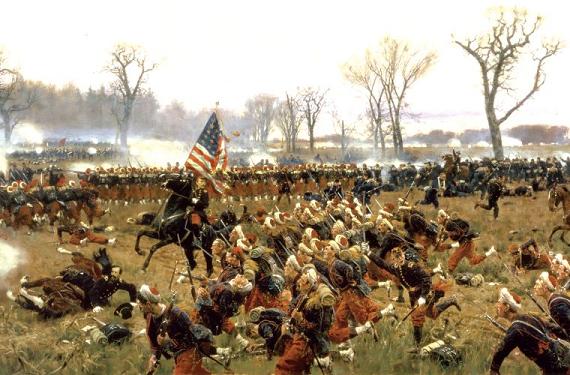
'Union Col. Charles Collis' charge at the Slaughter Pen Farm' by Carl Rochling
The following is a letter I sent to the Spotsylvania Board of Supervisors in support of the Civil War Trust's plans to purchase the abandoned GM Powertrain plant adjacent to the Slaughter Pen Farm. I encourage everyone to voice their support and help retrieve and protect this pivotal part of the Fredericksburg Battlefield.
August 8, 2011
Benjamin T. Pitts
Chairman
Spotsylvania County Board of Supervisors
Post Office Box 99
Spotsylvania, VA 22553
Dear Chairman Pitts,
I would like to take this occasion to voice my absolute support for the proposed purchase of the General Motors Powertrain plant on Tidewater Trail by the Civil War Trust. As a Civil War author, guide and documentary filmmaker, I am well aware of the historical significance of this location. The fact that we now have a chance to properly preserve it during the 150th Anniversary of the American Civil War presents the County with a tremendous opportunity.
As a local small-business owner providing battlefield tours to wheelchair travelers and disabled veterans, I rely on the continued protection of our region’s hallowed grounds. The Slaughter Pen Farm — just northwest from the GM plant — is one of the most pristine and unique spots on any of our area’s battlefields. Visitors routinely comment on how it is one of the few remaining places where they can truly “go back in time.” Together with the GM site, which the Civil War Trust plans to restore to its 1862 appearance, Spotsylvania County will have a true cultural — and economic — treasure, complete with interpretive signage and walking trails. This investment will further showcase our area as a historical gem while strengthening our visitation numbers.
I understand that since GM closed the plant last year, there has been little to no interest by other commercial entities to purchase it. Unfortunately, there is simply no market for large industrial structures in this economy. By razing the abandoned plant and transforming the property into a new destination park, the Civil War Trust estimates that this will translate into $1.2 million in heritage tourism benefits to the county per year.
This purchase appears to me to be the right decision on all counts — for our historical and economic benefit alike. Spotsylvania County has a wonderful opportunity to expand on its already stellar draw in heritage tourism and, at the same time, boost the many local businesses which rely on the visitors to our historic sites for our well-being. In today’s economy, we must embrace what sets us apart from other places and find ways to capitalize on them. Allowing the Civil War Trust to buy and restore the GM property is exactly what Spotsylvania needs.
Sincerely,
Michael Aubrecht
All-Access Battlefield Tours
www.pinstripepress.net/AABT.html

Thursday, 11 August 2011
A guide for guides
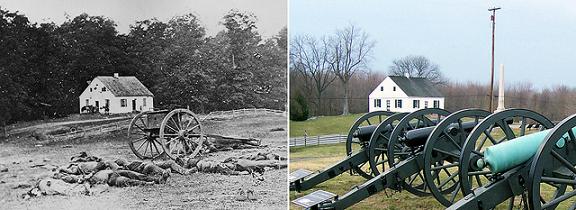
As a budding tour guide it is my job to recall the stories of the people and places that witnessed one of the darkest periods in American history. This task presents a unique challenge. You see when you come to Central Virginia and tour our Civil War battlefields, everything is perfect. From the immaculate markers and towering monuments, to the restored buildings and freshly painted cannons, there is little difference between the appearance of a national battlefield and a golf course. Both are protected and manicured.
On a clear winter's day, you can hike to the top of Marye’s Heights at the Fredericksburg battlefield and see all the way to Stafford County. In the fall, the brightly colored trees that line the walking trails at Chancellorsville and The Wilderness vibrate with color, while springtime reveals an ocean of wildflowers at Spotsylvania. They are romantic places to visit to say the least, like walking through a picture postcard.
Unfortunately these peaceful and serene settings are a façade that make it far too easy to forget that at the time of the American Civil War, these were not nice places to be. In fact, they were terrifying, and nauseating, and covered in the putrid stench of battle. A living nightmare would be more accurate, drenched in the grotesqueness of death and destruction.
Touring Civil War battlefields means walking among the dead. Therefore we must consciously remind ourselves from time to time that the beauty surrounding us is misleading. It is essential that we recall what really happened and never forget that the men who fought and died here baptized the soil with their blood.
As the country acknowledges the war's 150th anniversary more people will visit these hallowed grounds than ever before. It is our job to convey what made them worthy of our memory in the first place. In doing so, we must remind visitors that although our battlefields are beautiful; the war that took place on them was ugly.
We all want our guests to appreciate the surroundings.
We also want them to appreciate the sacrifice.
Dunker Church photo by Michael Aubrecht

Tuesday, 9 August 2011
To Tell the Truth
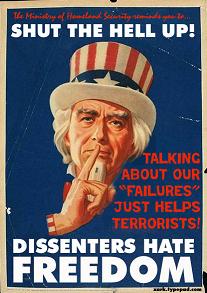 Last night I had a great conversation with a historian friend of mine over the economic crisis in Washington DC, or as he called it, an EPIC FAIL on behalf of our government. He is a freelance political journalist who often covers White House events and although he didn’t cover this train-wreck, he did pen an editorial that will hopefully get some play in the local papers. One topic that came up during our discussion was how this debt-ceiling debacle would be recorded historically and even more importantly, how would it be ‘spun’ in order to make America look less like the disappointment we have become.
Last night I had a great conversation with a historian friend of mine over the economic crisis in Washington DC, or as he called it, an EPIC FAIL on behalf of our government. He is a freelance political journalist who often covers White House events and although he didn’t cover this train-wreck, he did pen an editorial that will hopefully get some play in the local papers. One topic that came up during our discussion was how this debt-ceiling debacle would be recorded historically and even more importantly, how would it be ‘spun’ in order to make America look less like the disappointment we have become.
After all, isn’t that what we have done in this country? We manipulate, revise, and ignore our true history in order to present a more appealing heritage that we all can live with. Ask a foreigner from any other country what we think about American history and they will likely say we are full of bullshit. Frankly, it looks like we’ve been trying to pull the wool over people’s eyes for generations and now that we live in the Age of Information, it’s harder to pull off. Several bloggers have brilliantly summarized the dishonesty that exists in our historical memory and what we must do to overcome it:
“[Thomas] Jefferson's story reminds us that history is complicated. As Christians, we must always remember that there are no heroes in history. …History reminds us that when we put our confidence in people, whether they lived in the past (such as the founding fathers) or live in the present, we are likely to be inspired by them, but we are just as likely to be disappointed.” – John Fea, author of Was America Founded as a Christian Nation?
“I believe we can honor our ancestors for their admirable qualities and their misdeeds, without needing them to be infallible or blameless. I believe we can look at atrocities and injustices honestly, whether perpetrated by the victors or the vanquished …and start taking responsibility to give an honest appraisal of the evidence of history and its legacy today.” – Tim Abbott, “Pride and Shame 150 years after the Fact,” Walking the Berkshires
“Therein lies the danger of American exceptionalism. It discourages compromise, for what God has made exceptional, man must not alter. And yet clearly America must change fundamentally or continue to decline. It could begin by junking a phase that reeks of historical arrogance and discourages compromise. ‘American exceptionalism’ ought to be called ‘American narcissism.’ We look perfect only to ourselves.” – Richard Cohen, Washington Post
To acknowledge our faults and failures as a nation (past and present) is not at all unpatriotic, nor does it mean that we hate our country. It’s simply acknowledging the truth. As historians should we not question the lives and legacies of those who came before us? Isn't that the whole point of research and analysis? In recent years I have, albeit painfully at times, come to accept that it doesn’t matter if we like the answers we may find. What matters is that we find them.

Film Review
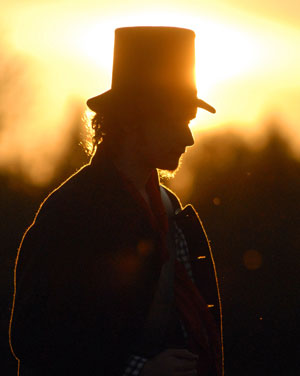
The War of 1812 (Official Website)
Premieres on PBS, Monday, October 10 at 9 p.m. EST
Last month the good folks over at WETA/PBS asked me if I would be interested in reviewing their upcoming documentary The War of 1812. Not knowing half of what I think I should know about this particular conflict, I eagerly accepted the opportunity and received a preview DVD along with a media kit. As a historian and documentary film producer, I feel that I have a broad understanding of what goes on in front of – and behind the camera. No doubt the biggest challenge when making historical films like this is finding a balance between education and entertainment. Great filmmakers can do this without compromising either side and I am pleased to say that the folks who produced this film exemplified this concept.
A production of WNED (Toronto), Florentine Films/HOTT Productions, in association with WETA, Washington DC, The War of 1812 is a 2-hour documentary that not only presents a historical look at the War of 1812, but also how it has been remembered and forgotten today. The film includes interviews with 26 leading American, British, Canadian and Native historians, first-hand accounts, battle re-enactments and period artwork which all help to define this war. In addition to battlefield exploits, the experiences of civilians and politicians are included. This includes familiar characters such as the Indian warrior Tecumseh and first lady Dolley Madison.
Of all the wars participated in by America, the War of 1812 is clearly the most overlooked one. According the film’s overview author and noted scholar Donald Hickey, the War of 1812 was “a futile and costly struggle in which the United States barely escaped dismemberment and disunion.” In other words, the Revolutionary War may have granted us independence but this conflict showed what we would do with it. Our friends in the Great White North see it differently. According to the film’s website:
Some would forget the war, and some would remember. If in time Americans largely forgot a war that had gone only sporadically well, and the British forgot a small war that was a distraction to the main event, the Canadian colonists were happy to remember the War of 1812, and Canadians still do. They remained British colonies, but many Canadians today see the war as the time when a disparate group – British, transplanted Americans, and French-Canadians – banded together to protect their land from invasion. The war united Canada in spirit. It's not only historians, but average Canadians, who often see the War of 1812 as a critical event in Canadian history.
From a producer’s point of view, I must say that The War of 1812 is a stellar example of what happens when intelligent and creative people come together to create what I call “smart art.” Visually the film is very pleasing to the eye, the re-enactments and character performances are not overly dramatic and the talking heads (albeit a bunch of them), add useful commentary. From a historian’s point of view I think the filmmakers did a great job of outlining what the War of 1812 was, obviously acknowledging that this subject matter is relatively neglected by the general public, and that most of us have no clue what we got out of it. Once again, the film’s website summarizes this beautifully:
The greatest myth about the war, for Americans, was who won it. For much of the war, the United States failed badly on the battlefield; but the final battle of the war, at New Orleans, gave Americans a false but powerful feeling that they had actually won. With the Treaty, they really lost nothing; and they had gained a sense of confidence, pride, and nationalism for the decades to come.
I highly recommend this documentary for anyone who wishes to learn about America’s forgotten war in an educational and entertaining way. After watching The War of 1812 I feel that I have a much better grasp on this event, and more importantly, a broader understanding of how American-British-and Canadian history intersects. For more information, visit the film’s website.

Saturday, 6 August 2011
Coming up...
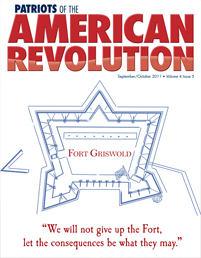 NEXT POST: A review of PBS's The War of 1812.
NEXT POST: A review of PBS's The War of 1812.
UPDATE: The latest issue of Patriots of the American Revolution (Sept./Oct.) is now shipping. My article on the Alexander Hamilton – Aaron Burr duel appears in the Culture, Art, & Conflict section (VIEW PDF). Titled “Burr's Behavior to Hamilton's Harangues: The Duel,” this feature also includes a detailed look at the Code Duello. My next piece will present Thomas Paine’s controversial pamphlet titled The Age of Reason; Being an Investigation of True and Fabulous Theology.
For the latest news on Patriot’s of the American Revolution’s upcoming issues and events, become a fan of their Facebook page.
Newer | Latest | Older








 Last night I had a great conversation with a historian friend of mine over the economic crisis in Washington DC, or as he called it, an EPIC FAIL on behalf of our government. He is a freelance political journalist who often covers White House events and although he didn’t cover this train-wreck, he did pen
Last night I had a great conversation with a historian friend of mine over the economic crisis in Washington DC, or as he called it, an EPIC FAIL on behalf of our government. He is a freelance political journalist who often covers White House events and although he didn’t cover this train-wreck, he did pen 
 NEXT POST: A review of PBS's
NEXT POST: A review of PBS's